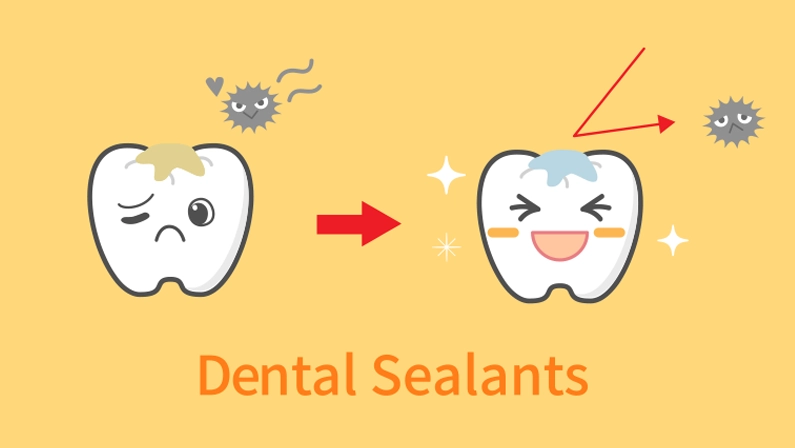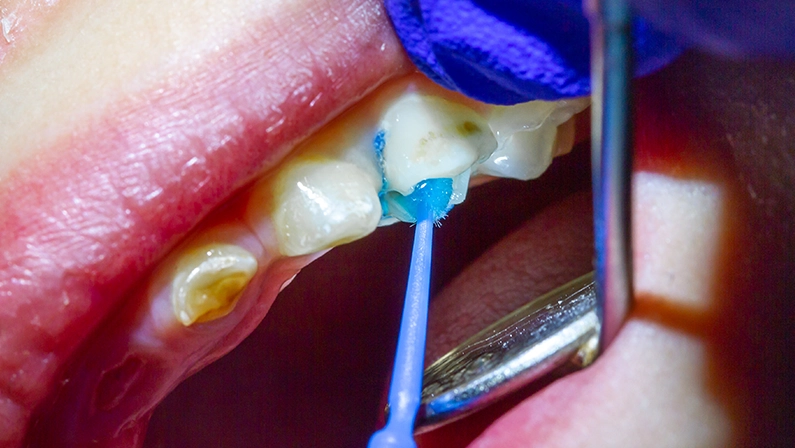Did you know that 90% of cavities occur in the back teeth where it’s hardest to brush? Dental sealants are a simple solution that can help prevent these cavities from forming, particularly in children and teens. If you’re wondering what dental sealants are, how they work, and whether they’re right for you or your child, you’ve come to the right place. In this article, we’ll dive deep into all things dental sealants, explaining their benefits, costs, and why they’re often recommended by dentists.
What Are Dental Sealants?

Dental sealants are a thin, protective coating that a dentist applies to the chewing surfaces of the back teeth, specifically the molars and premolars. These sealants act as a barrier, protecting the tooth’s enamel from food particles, plaque, and bacteria that can cause cavities.
The idea behind dental sealants is simple: they “seal” the deep grooves and pits on the surface of your teeth, which are more vulnerable to decay. While regular brushing and flossing are essential for maintaining good oral hygiene, sealants for teeth add an extra layer of protection where your toothbrush might not reach effectively.
What Are Dental Sealants Made Of?
The most common material used in dental sealants is a special type of dental resin, typically a plastic material. This resin is safe and durable, designed to bond directly to the tooth. Some dental sealants are also made from glass ionomer, which contains fluoride and can help strengthen the enamel over time.
The material used for the sealant is carefully selected to ensure that it is strong enough to withstand the pressure of chewing and durable enough to last for years. While dental sealants are primarily made for children and teens, they can also be applied to adult teeth that do not have existing fillings or decay.
Why Are Dental Sealants Placed on Teeth?
Dental sealants are primarily used to prevent tooth decay. They are particularly effective in children and teens because the deep grooves and pits in their back teeth tend to trap food and bacteria, making it harder to keep them clean.
For kids, dental sealants are a proactive way to prevent cavities before they start. Tooth sealant for kids is especially important because children may struggle with perfect brushing technique, which makes them more susceptible to tooth decay. However, dental sealants are also beneficial for adults who have deep pits and fissures in their molars.
Who Needs Dental Sealants?

Dental sealants are most commonly recommended for children and teenagers, especially once their permanent molars come in, which is typically around age 6 for the first set and around age 12 for the second set. Applying a tooth sealant for kids early can help prevent cavities during those formative years.
That said, adults can benefit from sealants too, particularly those who are cavity-prone or have not had significant tooth decay in their back molars. If you’ve noticed deep grooves in your teeth or if your dentist has recommended additional cavity prevention measures, sealants could be an excellent choice.
How Are Dental Sealants Applied?
The application of dental sealants is quick, painless, and non-invasive. Here’s what you can expect when you get sealants for teeth:
- Cleaning: The dentist will first clean the tooth thoroughly, ensuring no food particles or plaque are left behind.
- Drying: After cleaning, the tooth is dried, and a cotton pad is placed around it to keep it dry during the procedure.
- Preparation: An acidic solution is applied to the chewing surface of the tooth to roughen it slightly. This helps the sealant bond to the tooth more effectively.
- Application: The sealant material, typically a liquid resin, is painted onto the tooth’s surface, filling the grooves and pits.
- Curing: A special light is used to harden the sealant, making it durable and ready to protect the tooth from decay.
This entire process only takes a few minutes per tooth, and the results are immediate.
What Are the Benefits of Applying Dental Sealants?
There are several key benefits to applying dental sealants:
Cavity Prevention
Dental sealants can reduce the risk of cavities by up to 80% in molars.
Long-lasting Protection
Once applied, dental sealants can last up to 10 years with proper care.
Quick and Painless
The application process is non-invasive and painless, making it ideal for kids who might be nervous about dental procedures.
Cost-Effective
The cost of dental sealants is typically much lower than the cost of treating cavities. This preventive measure can save you from needing more expensive treatments down the line.
What Are the Disadvantages of Dental Sealants?
While dental sealants are a safe and effective way to prevent cavities, there are a few potential drawbacks:
Chipping or Wearing Down
Dental sealants can chip or wear down over time. Regular dental checkups allow your dentist to check the condition of your sealants and reapply them if necessary.
Not Permanent
Dental sealants are not a permanent solution. They need to be checked and reapplied periodically.
May Not Be Suitable for All Teeth
Not all teeth have deep fissures or grooves that require sealants. Your dentist will determine if sealants are right for your specific needs.
How Long Do Dental Sealants Last?
With proper care, dental sealants can last anywhere from 5 to 10 years. However, they will eventually wear down or chip due to the constant pressure from chewing. Regular dental checkups are essential to ensure that the sealants are still intact. Your dentist can reapply them as needed to maintain their protective effect.
When Should I See A Dentist About Sealants?
If your child’s permanent molars are coming in or if you’re an adult with deep grooves in your molars, it’s a good idea to talk to your dentist about dental sealants. Schedule an appointment for a consultation, especially if you or your child have had a history of cavities. Your dentist can assess your teeth and determine whether dental sealants are the right option for you.
Do I Still Need To Use Fluoride If I Have Dental Sealants?

Yes, even if you have dental sealants, fluoride is still an important part of your oral care routine. Fluoride helps to remineralize the enamel and protect the entire tooth surface, not just the areas covered by the sealant. Using fluoride toothpaste and drinking fluoridated water can help keep your teeth strong and healthy.
Schedule An Appointment With Your Dentist Today
Dental sealants are a simple, effective way to protect your teeth or your child’s teeth from cavities, especially in those hard-to-reach molars. If you have children or are considering dental sealants for yourself, schedule an appointment with your dentist to discuss your options. They can assess your risk of cavities and determine if sealants are right for you.
If you’re in the Houston area and looking for a trusted dentist, Dr. Saif Shere, DMD, at My Brownstone Dental, is an expert in general and cosmetic dentistry, including dental sealants, veneers, and more.
Located at 9824 Fondren Rd, Houston, TX 77096, Dr. Shere and his team are dedicated to providing top-quality dental care for the whole family. Whether you need routine dental care or specialized cosmetic procedures, Dr. Shere has the experience and expertise to help you achieve a healthy, beautiful smile.
To learn more about dental sealants and other services, visit My Brownstone Dental, explore our services, check out our specials, or schedule an appointment today.